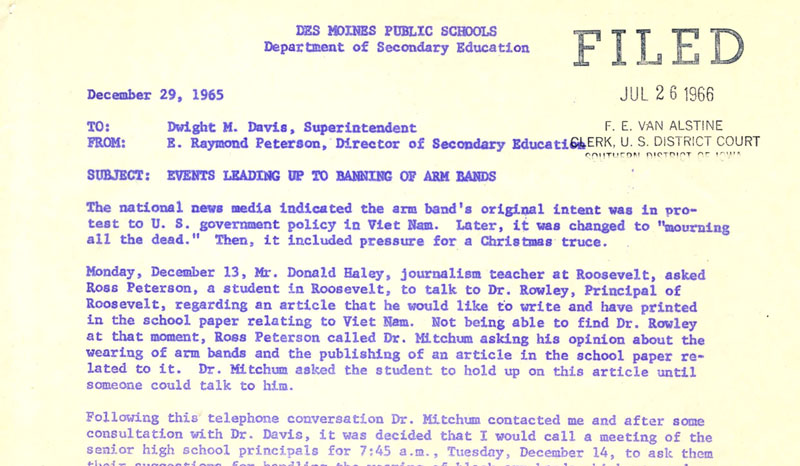

You might remember that last spring, thousands of students across the country walked out of their schools to protest gun violence in the wake of the tragic school shooting in Parkland, Florida. For the most part, these student protestors were not punished for their activism. But as recently as fifty years ago, that might not have been the case. In 1965, a girl named Mary Beth Tinker–and her brother John–forever changed the face of student activism in our country.
Who Was She?
In 1965, Mary Beth Tinker was an eighth-grade student living in Des Moines, Iowa. She and her siblings and friends decided to wear black armbands to school from December 16 to January 1 to protest the United States’ involvement in the Vietnam War and to mourn the people who had been killed on both sides of the conflict. The Des Moines school board, however, didn’t think that the protest should be allowed. The district’s principals all adopted a policy stating that students who wore black armbands to school would be asked to remove them, and if they didn’t, they would be suspended. The district made good on its threat. Several students, including Mary Beth and her brother John, were suspended. The Tinkers also received death threats and had their property vandalized.
With the help of the ACLU (American Civil Liberties Union), the Tinkers went to court. The case made it all the way to the U.S. Supreme Court (Tinker vs. Des Moines Independent School District). In 1969, the Court ruled in favor of Tinker and her brother John, saying that students and teachers in public schools do have First Amendment rights, including freedom of speech and expression. By punishing the students, the school district had violated these rights.
What Happened Next?
Mary Beth went on to graduate and to receive masters degrees in both public health and nursing. She became a pediatric nurse and an active union member. However, she also never stopped fighting for free speech rights, especially for students and young adults.
Where Is She Now?
In 2013, Tinker and Student Press Special Project Attorney Mike Hiestand embarked on a national tour known as the Tinker Tour, speaking to more than 20,000 students and teachers about the importance of civics, student free speech rights, and a strong independent student press. After the tour was completed, Tinker continued reaching out to teachers and students through her Web site and blog. She continues to speak frequently at schools and universities all over the country, advocating for youth rights.
